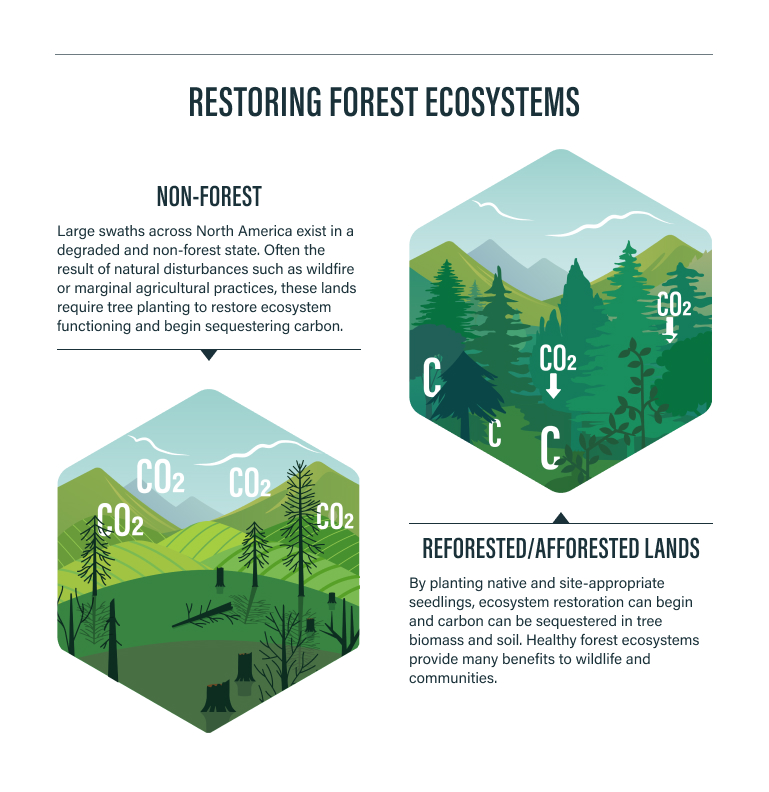Reforestation
The Climate Trust funds and manages tree planting and forest restoration for landowners and managers across the country.
After wildfires and other disturbances, forests often go unplanted and the land remains in an unproductive and degraded state. Reforestation and afforestation projects offer one of the largest opportunities to reduce carbon emissions and store more carbon in the trees than any other nature-based solution. Replanting these forests restores diverse ecosystems and builds climate resiliency for wildlife and communities.
With a focus on climate vulnerable communities and ecosystems, The Climate Trust ensures that carbon markets are accessible to diverse landowners who historically have not been able to benefit from them. By restoring forests and planting new trees, we can drive new economic opportunities, revitalize our great American landscapes, and create thriving forest ecosystems that benefit the climate and the people that live there.
Funding for Landowners to Reforest
The Climate Trust (TCT) funds and manages tree planting and forest restoration for landowners and land managers across the country. Funding is available to reforest lands impacted by wildfire, hurricanes, and other natural disturbances. Funding is also available to afforest land that has been in non-forest use for at least 10 years. Where eligible, re-established forestland will be enrolled in a carbon offset development project. TCT carbon market experts will ensure the forestland’s carbon and climate benefit is evaluated for optimal value, and the project is structured to be compatible with sustainable timber production that supports landowner management objectives.
Structure
TCT foresters collaborate with landowners to design a reforestation project with native, site-appropriate tree seedlings to re-establish a working forest that meets landowner objectives.
TCT pays for and manages tree planting activities, including site preparation and post-establishment treatments.
Landowner and TCT enter into a partnership wherein TCT develops, manages and sells carbon offsets over a 40-year term.
Landowner provides access to TCT for forest establishment and monitoring.
Landowner and TCT share revenues from offsets during the 40-year term to support ongoing management.
Landowner retains all climate-smart timber revenue and commits to foregoing regeneration harvests until the 40-year term has expired.
Basic Eligibility
Landowner interest in reforestation and long-term sustainable forest management
500-acre total minimum, can include multi-year plantings or multiple ownerships
Land must either be in a non-forest use for preceding 10 years (e.g. pasture management) or deforested due to natural disturbance
Land must be on private, Tribal, or non-Federal public lands
This material is based upon work supported by the U.S. Department of Agriculture, under agreement number NR233A750004G020.
Project Development Process


The Climate Trust works directly with landowners to determine their eligibility, plant and maintain forests, measure, model, and verify forest growth, and market and sell resulting carbon credits.
why work with us?
The Climate Trust funds and manages reforestation and afforestation projects on lands that have been deforested due to natural disturbances like wildfires or that have been non-forest for at least 10 years. Our foresters work directly with landowners and any stakeholders they may have to design a reforestation project that works for their land. We typically develop projects on lands that are at least 500 acres total and offer a free evaluation of project feasibility—including an optimal path for valuing and marketing the carbon and climate benefits of a carbon project. After conducting a site visit, we identify site-appropriate seedlings that will generate climate-smart timber. We pay for and manage the planting of trees and our carbon market experts ensure that the timberland’s carbon and climate benefit is valued for the best price.
The Climate Trust has worked for over 25 years to support good land stewardship and support climate vulnerable communities who may be dealing with the aftermath of wildfires or other natural disturbances. We work with public and private landowners, managers, land trusts, and Tribal Nations to reforest land or to plant trees where there hasn’t been a forest for 10 or more years. As a nonprofit and one of the oldest carbon entities in the nation, we have a breadth of experience including public and private forest management, operations, forestry consulting, sustainable forestry certifications, and forest carbon investments.

what are reforestation and afforestation projects?
When wildfires and other natural disturbances destroy forests, the diverse ecosystems for wildlife and plants are destroyed with it and significant amounts of carbon emissions are released into the atmosphere. In implementing a reforestation project, The Climate Trust replants site-appropriate trees and restores the landscape and ecosystem. In the case of afforestation, land must be non-forest for over 10 years. This means that fields or other land can be converted back into a forest through the planting of seedlings. Both reforestation and afforestation build back ecosystems that were lost and keep more carbon stored in the trees and soil, creating a more climate resilient future.
Common terms
- Carbon Offset: the storage or avoided emission of one metric ton of carbon dioxide (the atmospheric equivalent) after applying transparent, science-based carbon accounting and passing third-party verification.
- Co-benefits: positive impacts on the ecosystems, biodiversity, wildlife, and community surrounding a carbon project.
- Additionality: the reduction or removal of carbon emissions resulting from a carbon project compared to a baseline. In the case of reforestation, carbon sequestered and stored in newly planted trees is compared against a baseline scenario of land in a state of continued degradation and deforestation.
- Third-party Verification: the verification of a project’s eligibility, measurements, and modeling through an ANSI-accredited verification body or auditor.